|
|
|
Sort Order |
|
|
|
Items / Page
|
|
|
|
|
|
|
| Srl | Item |
| 1 |
ID:
129636
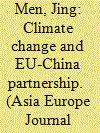

|
|
|
|
|
| Publication |
2014.
|
| Summary/Abstract |
Both the EU and China are important participants in the United Nations Framework Convention on Climate Change and the Kyoto Protocol. The EU's reliance on legally binding rules and institutions demonstrates its strong belief on institutionalism. While interstate cooperation is certainly necessary, implementation of any international agreement and most of the work needs to be done within a state. Henceforth, an uneasy balance between national interests and international responsibility has to be maintained. In the case of EU-China partnership, the carbon aviation tax issue serves as a good example to examine the realist-institutionalist struggle. Although it is still too early to tell if the EU and China would overcome their major disagreements in the field of climate change, there is reason to believe that an international agreement may be reached by 2015.
|
|
|
|
|
|
|
|
|
|
|
|
|
|
|
|
| 2 |
ID:
129625
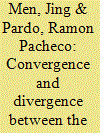

|
|
|
|
|
| Publication |
2014.
|
| Summary/Abstract |
The EU and China, the first and third largest economies in the world, launched a strategic partnership in 2003. From the onset, this partnership had two main objectives: deepening and broadening cooperation and enhancing bilateral collaboration on a wide range of policy areas at the global level. On the 10th anniversary of the partnership, this special issue seeks to provide a comprehensive analysis of the mechanisms, the evolution and current state of EU-China relations, and the divergence and convergence between them on a number of issues. The special issue includes articles setting out the historical and institutional background behind the EU-China partnership, examining their cooperation and problems in the economic, financial, climate change and security fields as well as in relation to third parties. In this way, this special issue covers the most important fields of policy coordination and cooperation between the EU and China.
|
|
|
|
|
|
|
|
|
|
|
|
|
|
|
|
| 3 |
ID:
129627
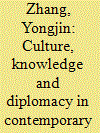

|
|
|
|
|
| Publication |
2014.
|
| Summary/Abstract |
The worlds that Matteo Ricci lived in-early modern Europe, Ming China and the pre-Westphalian international order-are vastly different from the world of the 21st century, when accelerated globalization binds China and Europe together as never before and when global international society is moving decisively beyond Westphalia. How much are the legacies of Matteo Ricci still relevant, 400 years on, to enriching the relationship between China and Europe in the 21st century? This paper starts with a brief overview of the civilizational encounters between China and Europe and the unfolding of their turbulent and often troubled relationship over the last four centuries of wars, collapse of empires, internal convulsions, nation-state building, scientific and industrial revolutions and great economic transformations. Against this historical narrative is the discussion of Matteo Ricci as a cultural agent, a knowledge broker and a practitioner of public diplomacy in fostering Sino-European relations in its nascent years. The paper argues that even in an increasingly globalized world, Matteo Ricci's conception of culture, his wisdom about the power of knowledge and his practice of people-to-people diplomacy remain valuable in informing both China and the EU, two aspiring global players, in their search for a viable China-EU strategic partnership.
|
|
|
|
|
|
|
|
|
|
|
|
|
|
|
|
| 4 |
ID:
167807
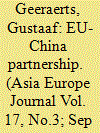

|
|
|
|
|
| Summary/Abstract |
The EU-China relationship is driven by two distinct underlying logics: a power-based one and a transformational one. The power-based logic is premised on a belief that because of anarchy, power politics and conflicts of interest cannot be entirely overcome. According to this view, intercourse between the EU and China will reflect their relative power positions and display concerns about relative gains, making cooperation between them more difficult. In contrast, a transformational logic reflects a more liberal/constructivist perspective. It suggests that rules and shared norms can sharply reduce conflicts of interest and mitigate concerns about relative gains through the creation of trust and reciprocal socialization, making enduring cooperation between the EU and China more likely. The EU-China relationship is thus clearly mixed, consisting of an array of cooperative and competitive elements. At any given moment, the relationship can be pictured as residing somewhere along a spectrum that extends from pure cooperation at one extreme to unrestrained competition at the other. Diverging trends, which are mutually reinforcing, are pushing the relationship toward competition, converging trends—also reinforcing each other—are promoting cooperation. The direction in which the EU-China partnership can possibly evolve—more competition or more cooperation—will be moulded by the relative strength of diverging and converging trends.
|
|
|
|
|
|
|
|
|
|
|
|
|
|
|
|
| 5 |
ID:
129634
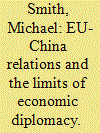

|
|
|
|
|
| Publication |
2014.
|
| Summary/Abstract |
This paper addresses a key problem in EU-China economic relations: the capacity of the EU to exert leverage through its economic diplomacy in the context of key economic trends, policy dilemmas, and processes of governance. The paper begins by identifying key elements of the EU's economic diplomacy and their relationship to key functions: deliberation, representation, communication, and negotiation. It continues by reviewing key trends and challenges in EU-China economic relations, in terms of trade, finance/investment, and broader issues of economic performance, with special reference to the problems emanating from the current economic turbulence both in the EU and in the broader global political economy. It then identifies a number of key policy dilemmas for the EU in areas such as trade defense/trade promotion, environment/development, security/commercial priorities, nvestment/sovereignty, and explores these in terms of three key concepts: orientation, coordination, and effectiveness. In pursuing this analysis, the paper relates these trends and dilemmas to attempts to govern EU-China economic relations: public/private, bilateral/multilateral, and regulatory/political. In the final section of the paper, these efforts are evaluated in the context of the EU's economic diplomacy, with relation to key actors, processes, and outcomes and to the key functions of deliberation, representation, communication, and negotiation.
|
|
|
|
|
|
|
|
|
|
|
|
|
|
|
|
| 6 |
ID:
129637


|
|
|
|
|
| Publication |
2014.
|
| Summary/Abstract |
The global financial crisis (GFC) and subsequent Eurozone sovereign debt crisis (ESDC) have made reform of the global financial governance regime a priority for governments around the world. Prior to the crisis, neoliberal policies agreed between the European Union and the USA created a financial governance regime based on the principle of free operation of the market through the norms of market self-regulation, equal access to the market, and stability via institutional supervision. How will global financial governance look like after these crises? And what role can the EU and China play in shaping this regime? This article argues that as a result of the GFC and the ESDC, stability is becoming a second principle of global financial governance, along with the free operation of the market. Meanwhile, European and Chinese views regarding the norms, rules, and decision-making procedures designed to implement those principles do not differ as much as they used to. Thanks to interactions at the bilateral and multilateral levels, the EU and China now have knowledge regarding how the other understands the role and characteristics that financial governance should have. This is leading to convergence in some areas and cooperation in others. Concurrently, there are also areas of competition. Analysing all of these is essential to understand how global financial governance might evolve, given the central role that the EU and China now play in this regime.
|
|
|
|
|
|
|
|
|
|
|
|
|
|
|
|
| 7 |
ID:
129630


|
|
|
|
|
| Publication |
2014.
|
| Summary/Abstract |
This article looks at matters of trust, of structures and of dialogue in the European Union (EU)-China relations. It argues that EU-China relations need resetting given the increasingly negative perceptions of China in Europe and given Chinese dissatisfaction with what it considers to be a degree of EU incoherence, incompetence and inconsistencies. Their 'strategic partnership' proclaimed in 2003 in many ways is rather empty and lacks much coordination of diplomacy. Their economic relationship while substantial is problematic and asymmetric in nature. However, restructuring the relationship through new dialogue mechanisms and agreements may resettle their relationship along more pragmatic functional grounds. In particular, the creation in 2012 of a third High Level Dialogue, at Track-2 rather than Track-1 level, that of People-to-People (PPD), may reduce the 'trust deficit' in the still longer term. Consequently, the article seeks to contextualize and evaluate the rhetoric and substance surrounding the various dialogue meetings and structures emerging in 2012. It also considers the progress, or perhaps lack of progress, on concluding a Partnership and Cooperation Agreement (PCA). It concludes that one way forward is to de-politicize the partnership.
|
|
|
|
|
|
|
|
|
|
|
|
|
|
|
|
|
|
|
|
|